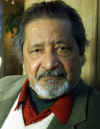| the-south-asian.com JANUARY 2002 | ||
| about us contact us data bank past issues the craft shop the print gallery | ||
|
JANUARY 2002 Contents
Literature Pakistani
Literature Visual Arts South
Asian Art -
shared Rare
photographs of Indian Outlook Technology India
& China - major global Foreign
Investors in India's People Sports Books 'Knock
at Every Alien Door' Society
Books
|
V S Naipaul The Nobel Prize in Literature 2001 V S Naipaul - AP Photo
The Nobel Prize in Literature for 2001 is awarded to the British writer, born in Trinidad, V.S. Naipaul "for having united perceptive narrative and incorruptible scrutiny in works that compel us to see the presence of suppressed histories". V.S. Naipaul is a literary circumnavigator, only ever really at home in himself, in his inimitable voice. Singularly unaffected by literary fashion and models he has wrought existing genres into a style of his own, in which the customary distinctions between fiction and non-fiction are of subordinate importance. Naipaulís literary domain has extended far beyond the West Indian island of Trinidad, his first subject, and now encompasses India, Africa, America from south to north, the Islamic countries of Asia and, not least, England. Naipaul is Conradís heir as the annalist of the destinies of empires in the moral sense: what they do to human beings. His authority as a narrator is grounded in his memory of what others have forgotten, the history of the vanquished. The farcical yarns in his first work, The Mystic Masseur, and the short stories in Miguel Street with their blend of Chekhov and calypso established Naipaul as a humorist and a portrayer of street life. He took a giant stride with A House for Mr. Biswas, one of those singular novels that seem to constitute their own complete universes, in this case a miniature India on the periphery of the British Empire, the scene of his fatherís circumscribed existence. In allowing peripheral figures their place in the momentousness of great literature, Naipaul reverses normal perspectives and denies readers at the centre their protective detachment. This principle was made to serve in a series of novels in which, despite the increasingly documentary tone, the characters did not therefore become less colourful. Fictional narratives, autobiography and documentaries have merged in Naipaulís writing without it always being possible to say which element dominates. In his masterpiece The Enigma of Arrival Naipaul visits the reality of England like an anthropologist studying some hitherto unexplored native tribe deep in the jungle. With apparently short-sighted and random observations he creates an unrelenting image of the placid collapse of the old colonial ruling culture and the demise of European neighbourhoods. Naipaul has drawn attention to the novelís lack of universality as a form, that it presupposes an inviolate human world of the kind that has been shattered for conquered peoples. He began to experience the inadequacy of fiction while he was working on The Loss of El Dorado, in which after extensive study of the archives he described the appalling colonial history of Trinidad. He found that he had to cling to the authenticity of the details and the voices and abstain from mere fictionalisation while at the same time continuing to render his material in the form of literature. His travel books allow witnesses to testify at every turn, not least in his powerful description of the eastern regions of the Islamic world, Beyond Belief. The authorís empathy finds expression in the acuity of his ear. Naipaul is a modern philosopher, carrying on the tradition that started originally with Lettres persanes and Candide. In a vigilant style, which has been deservedly admired, he transforms rage into precision and allows events to speak with their own inherent irony.
The Swedish Academy
Copyright © 2000 - 2001 [the-south-asian.com]. Intellectual Property. All rights reserved. |
|
